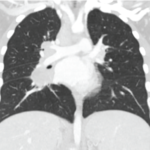Patients with acute pericarditis who are treated with colchicine in combination with a traditional antiinflammatory therapy experience a significantly reduced rate of incessant or recurrent pericarditis. (posted Oct. 31)
The ACR/CHEST ILD Guidelines in Practice, a video
In collaboration with the American College of Chest Physicians, the ACR released two new comprehensive guidelines aimed at improving the screening, monitoring, and treatment of patients with interstitial lung disease (ILD) secondary to systemic autoimmune rheumatic diseases (SARDs). Recently, Sindhu R. Johnson, MD, PhD, professor of medicine at the University of Toronto, Canada, director of the Toronto Scleroderma Program and principal investigator for the guideline, and Elana J. Bernstein, MD, MSc, Florence Irving associate professor of medicine in the Division of Rheumatology at Columbia University, New York City, and co-first author, presented a webinar to talk about how the guidelines were developed and present some of the recommendations and their rationale: Watch the recording now!
Survey Highlights High Out-of-pocket Costs for RA Care
The “RA in America 2013″ survey estimates out-of-pocket cost for RA treatment at $1,000 to $5,000 per year. (posted Oct. 25)
Telomere Length Provides Insights into Cartilage Aging and Repair
Chondrocyte telomere length might play a role in the natural aging of cartilage, as well as the development and progression of OA. (posted Oct. 8, 2013)
Study Points to Need for Increased Antirheumatic Therapy in Patients with Dyslipidemia
A new study suggests that patients diagnosed with RA as well as dyslipidemia may benefit from more aggressive antirheumatic therapy. (posted Oct. 3, 2013)
Immunology Research Pioneers Receive Carol Nachman Prize
Rheumatologists Gerd R. Burmester, MD, of Berlin, and Michael B. Brenner, MD, of Boston, honored with prestigious international award
Interplay Between Physician Employment Agreements, Medical Staff Bylaws Should Not be Ignored
Doctors must consider and review bylaws of hospital medical staff privileges when entertaining employment with a hospital or private practice
Continued Congressional Lobbying by ACR Volunteers Needed to Repeal SGR
Ways you can advocate for legislation to replace the Medicare Sustainable Growth Rate formula
Rheumatology Research Foundation Advances Studies in Inflammatory Arthritis
Disease Targeted Research Initiative may improve treatment, prevention of rheumatoid arthritis, other inflammatory diseases
New Insights into CPPD
Progress in research, outcomes, diagnosis, and treatment of calcium pyrophosphate dihydrate crystal deposition disease
Supreme Court Decision on Gene Patents Good News for Clinicians, Researchers
The recent U.S. Supreme Court decision that ruled human genes cannot be patented may provide greater access to genetic testing. (posted Sept. 24, 2013)
- « Previous Page
- 1
- …
- 189
- 190
- 191
- 192
- 193
- …
- 250
- Next Page »
